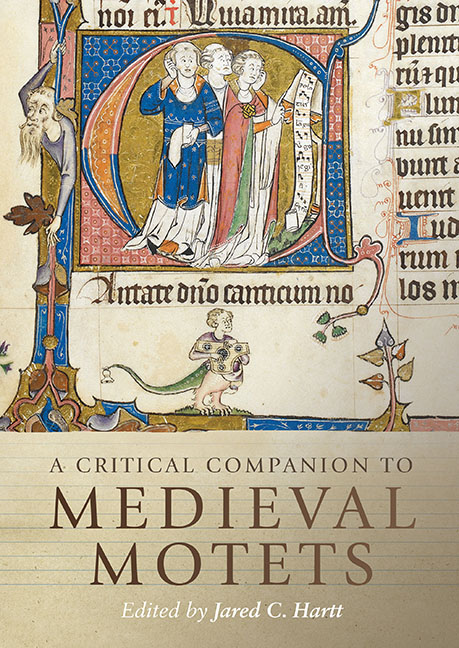Book contents
- Frontmatter
- Dedication
- Contents
- List of Figures
- List of Music Examples
- List of Tables
- List of Contributors
- Preface
- Acknowledgments
- Abbreviations
- Introduction: Approaching Medieval Motets
- 1 The Genre(s) of Medieval Motets
- 2 Origins and Interactions: Clausula, Motet, Conductus
- 3 Tracing the Tenor in Medieval Motets
- 4 Isorhythm
- 5 Notation
- 6 Thirteenth-Century Motet Functions: Views through the Lens of the Portare Motet Family
- 7 A Prism of its Time: Social Functions of the Motet in Fourteenth-Century France
- 8 Motets, Manuscript Culture, Mise-en-page
- 9 Clerics, Courtiers, and the Vernacular Two-Voice Motet: The Case of Fines amouretes / Fiat and the Roman de la poire
- 10 When Words Converge and Meanings Diverge: Counterexamples to Polytextuality in the Thirteenth-Century Mote
- 11 Motets in Chansonniers and the Other Culture of the French Thirteenth-Century Motet
- 12 Building a Motet around Quoted Material: Textual and Musical Structure in Motets Based on Monophonic Songs
- 13 The Duet Motet in England: Genre, Tonal Coherence, Reconstruction
- 14 Materia Matters: Reconstructing Colla/Bona
- 15 Machaut’s Motet 10 and its Interconnections
- 16 A Motet Conceived in Troubled Times: Machaut’s Motet 22
- 17 A Motet Ahead of its Time? The Curious Case of Portio nature/Ida capillorum
- Bibliography of Works Cited
- Select Glossary
- Index of Cited Motets
- General Index
- Studies in Medieval and Renaissance Music
16 - A Motet Conceived in Troubled Times: Machaut’s Motet 22
Published online by Cambridge University Press: 21 October 2020
- Frontmatter
- Dedication
- Contents
- List of Figures
- List of Music Examples
- List of Tables
- List of Contributors
- Preface
- Acknowledgments
- Abbreviations
- Introduction: Approaching Medieval Motets
- 1 The Genre(s) of Medieval Motets
- 2 Origins and Interactions: Clausula, Motet, Conductus
- 3 Tracing the Tenor in Medieval Motets
- 4 Isorhythm
- 5 Notation
- 6 Thirteenth-Century Motet Functions: Views through the Lens of the Portare Motet Family
- 7 A Prism of its Time: Social Functions of the Motet in Fourteenth-Century France
- 8 Motets, Manuscript Culture, Mise-en-page
- 9 Clerics, Courtiers, and the Vernacular Two-Voice Motet: The Case of Fines amouretes / Fiat and the Roman de la poire
- 10 When Words Converge and Meanings Diverge: Counterexamples to Polytextuality in the Thirteenth-Century Mote
- 11 Motets in Chansonniers and the Other Culture of the French Thirteenth-Century Motet
- 12 Building a Motet around Quoted Material: Textual and Musical Structure in Motets Based on Monophonic Songs
- 13 The Duet Motet in England: Genre, Tonal Coherence, Reconstruction
- 14 Materia Matters: Reconstructing Colla/Bona
- 15 Machaut’s Motet 10 and its Interconnections
- 16 A Motet Conceived in Troubled Times: Machaut’s Motet 22
- 17 A Motet Ahead of its Time? The Curious Case of Portio nature/Ida capillorum
- Bibliography of Works Cited
- Select Glossary
- Index of Cited Motets
- General Index
- Studies in Medieval and Renaissance Music
Summary
MACHAUT'S FOUR-VOICE MOTET Tu qui gregem/Plange regni respublica/Apprehende arma et scutum/Contratenor, positioned twenty-second within the series of motets preserved in the late manuscript collections of his oeuvre, begins poignantly with the single word ‘Plange’ (‘Weep’) uttered at length (nine breves) by the motetus voice alone, followed by the words ‘regni respublica’; see Example 16.1. It is the French kingdom's body politic (to which Machaut's original listeners belong) that is commanded to weep. On the last syllable of ‘regni’, the triplum enters with the pronoun ‘Tu’, the intimate ‘you’. Only after the tenor and contratenor have entered is the referent of ‘Tu’ revealed – it is the person who leads the flock, that weeping body politic, the person who, as the text then reveals, has so far failed as an effective leader. The opening words of the two poems announce the complementary relationship between them, as may be seen in the texts with their translation that appear on the next page. The triplum text exhorts an unnamed person in authority to step up and lead effectively, while the motetus text expresses the suffering and hope for relief of the French people who urgently need a protective, caring, and effective leader. The acute problem of leadership is hammered home rhetorically by the triplum's intensive repetition of ‘dux’ (‘leader’), ‘ducere’ (‘to lead’) and their cognates – twenty times in as many poetic lines. The texts directly voice the concerns of those who would have heard this motet when it was first performed in Reims circa 1358–9.
Triplum
Tu qui gregem tuum ducis, You who lead your flock,
Opera fac veri ducis, do the deeds of a true leader,
Nam ducere et non duci, for to lead and not to be led,
Hoc competit vero duci. this constitutes a true leader.
Dux prudentium consilio Let the leader, counseled by judicious men,
Ducat nec sit in octio lead, and not be passive.
Debetque dux anteire, For a leader should go before,
Ductus autem obedire. and those led should obey.
Sed si ductor nescit iter But if the leader does not know the way,
Ambo pereunt leviter. they both easily perish,
Nam ambulat absque luce for he who is led by a blind leader
Qui ducitur ceco duce. walks deprived of light.
- Type
- Chapter
- Information
- A Critical Companion to Medieval Motets , pp. 321 - 340Publisher: Boydell & BrewerPrint publication year: 2018

